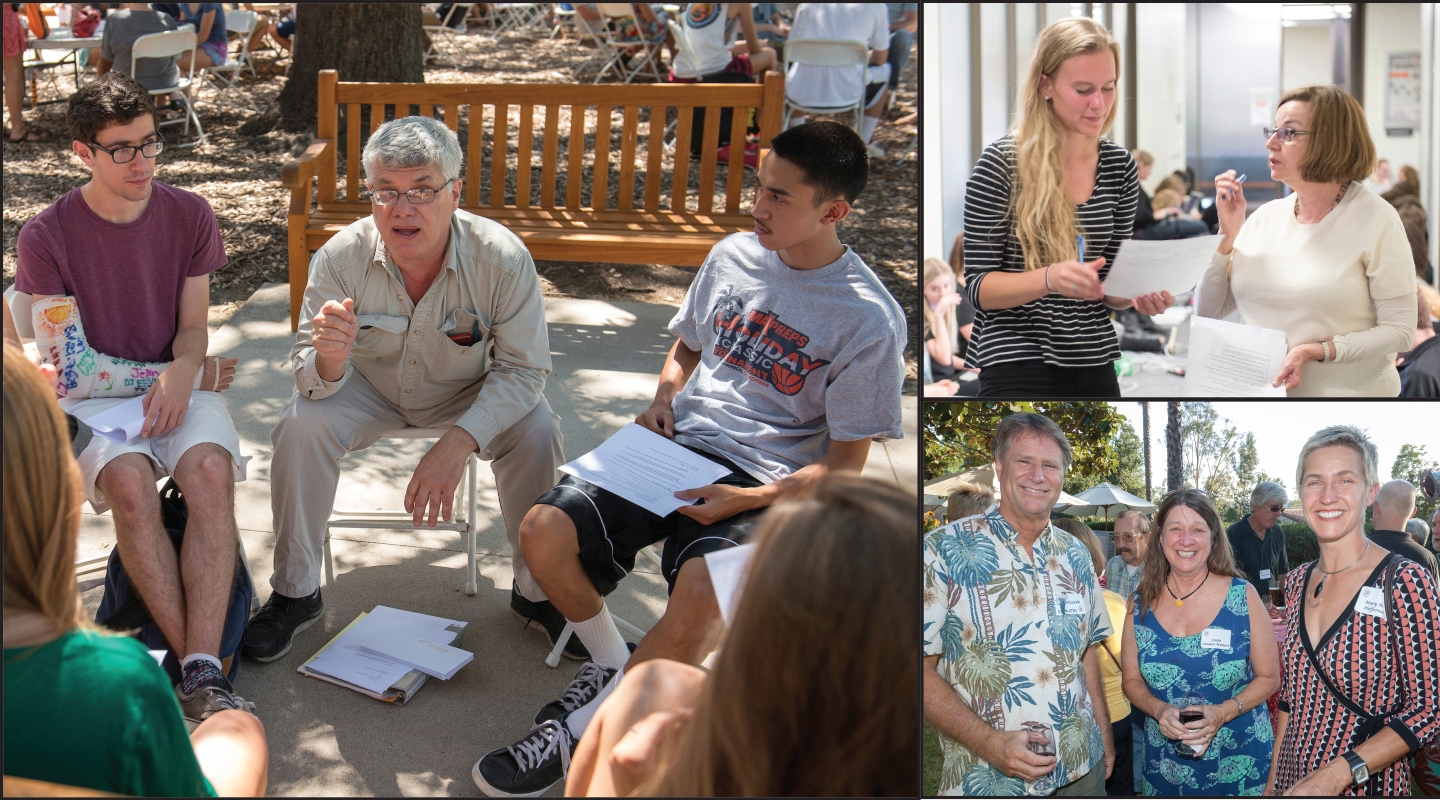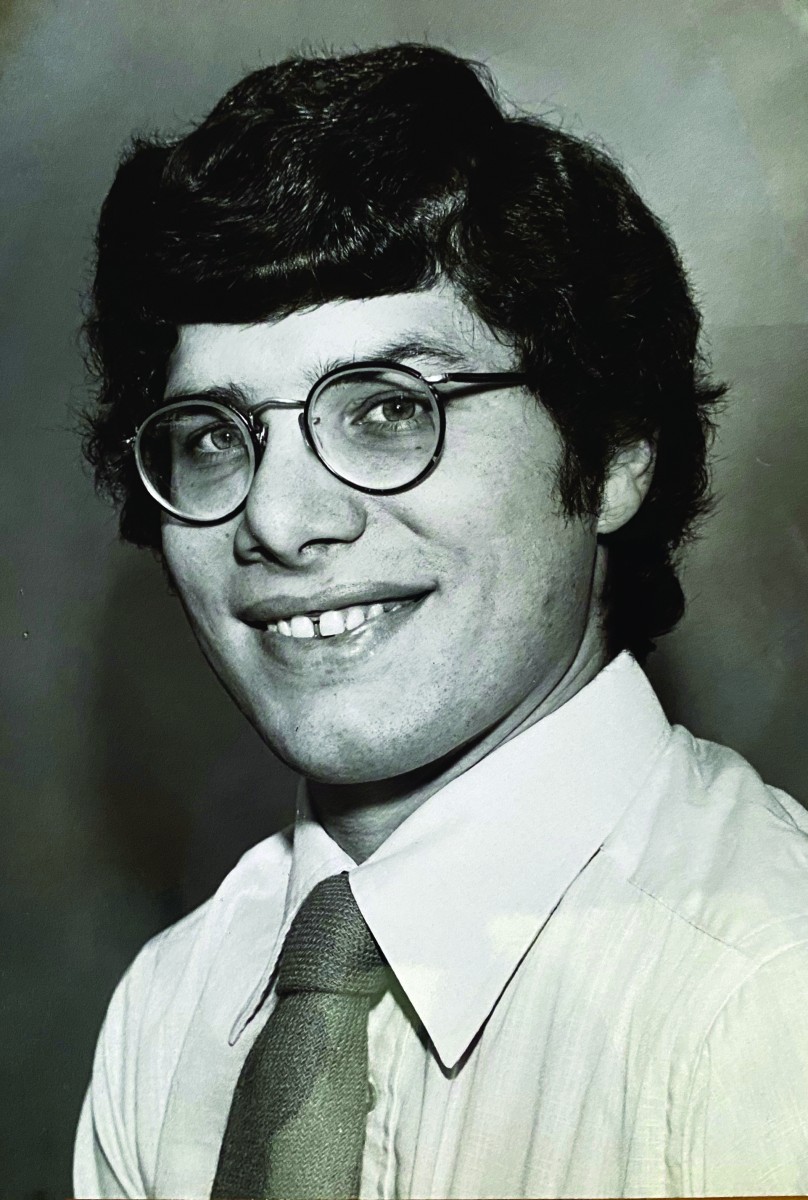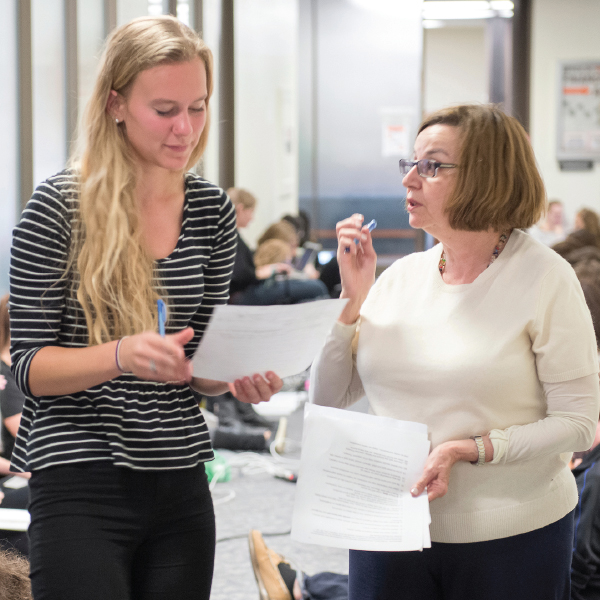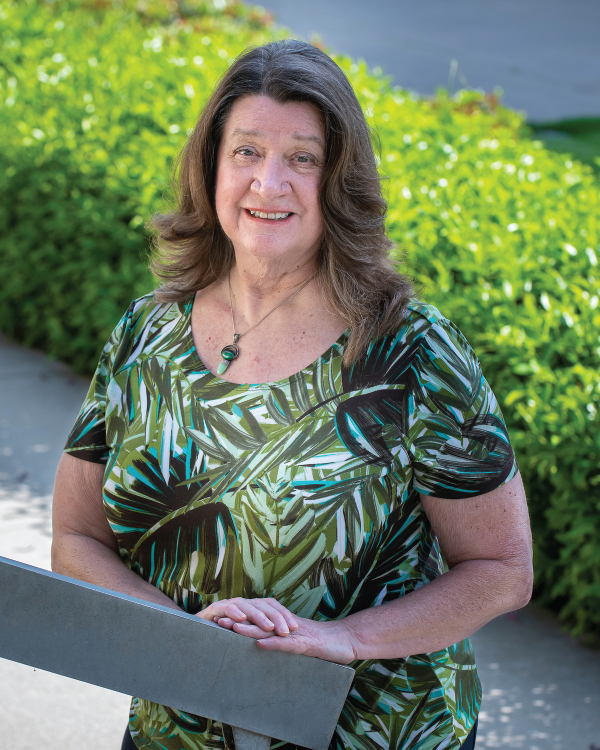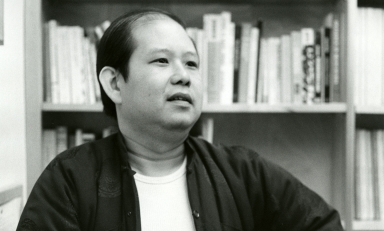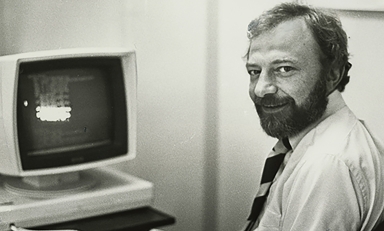Professors Dan Fineman, Adelaida Lopez, and Linda Lasater had a lasting impact outside the classroom—just ask their students
It’s a rite of passage each spring—as Oxy says goodbye to a newly minted class of graduates, a handful of professors grade their last set of papers. Following the conclusion of the academic year, English professor Dan Fineman, Spanish and French studies professor Adelaida Lopez, and adjunct chemistry professor Linda Lasater are retiring from the College. But this year, their customary sendoff—a department party, an academic reception, recognition during Commencement in Hillside Theater—has been upstaged by a once-in-a-century pandemic.
Fineman, who turned 70 last September, has been riding out the quarantine with his wife of 38 years at their home in Eagle Rock. “On one hand, we don’t have to go anywhere in order to make our livelihoods,” says Fineman, who met Pamela Hillman in 1979 when she was working in the Oxy registrar’s office (where she worked for three years). “On the other hand, we are the people who are most liable to die from this.“It’s an interesting mixed bag.”
In his 44 years of teaching at Occidental, Fineman’s main educational passions have been the work of Herman Melville—the subject of his dissertation at Princeton University—and Emily Dickinson. “My wife calls her ‘the other woman,’” he says.
A native of Vineland, N.J., Fineman came to Occidental in 1976 from Princeton, where he taught for two years while completing his Ph.D. in American literature. With the job market slumping in 1975, “The tactic was to send out as many applications as you could possibly muster,” he recalls. “Oxy was kind enough to interview me. I thought it was unbelievable here.”
Compared to the Princeton winters—which are “basically mud [but] very good for scholarship,” he says—“out here it was birds of paradise and wonderful warm weather. Oxy was the first one that called me up and offered me a job. I accepted it and had the great pleasure of calling up four schools and say, ‘No, thank you.’”
Fineman has shared his enthusiasm for 19th-century American literature with generations of Oxy students. Among them is Rob Williams ’86, a Melville fan who had just dropped a class and was shopping for a replacement when he eyed a stack of Melville’s novels in the Occidental bookstore and thought, “Here’s my ticket.”
“We plowed through all Melville’s novels,” says Williams, who majored in history at Oxy. “It was fantastic—probably the most interactive, completely collaborative class I ever had at Oxy. We argued about things constantly. Dan would come to class with a different take on something every time. After that, I took lots of other classes with him.”
Williams utilizes Fineman’s teachings to this day as owner of Ontometrics, the L.A.-based software development company he founded in 1988. “Dan uses a fusion of literature and philosophy, so that influenced me a lot. I feel like philosophy plays a pretty ongoing role in software development.”
For Fineman, the greatest reward of teaching is simple. “Some students catch fire. When you see someone wake up intellectually, that’s the most thrilling thing,” he says.
“He teaches with such passion and intensity,” says Ethan Goldberg ’14, who majored in English and comparative literary studies at Oxy and is currently an adjunct professor and fellow at Queens College, City University of New York. “He cared on a visceral level about people understanding the material and making the material relevant for them beyond just some poem.”
When he completes his Ph.D., Goldberg—who took four classes with Fineman—plans to look for a job as an English professor, passing on the Fineman fire. “Each piece of writing that we looked at was considered at an almost life-or-death level,” he says. “And he makes his passion contagious. I still think about classes that I took with him.”
Delarys Ramos Estrada ’19 encountered Fineman as a sophomore when she took American Literature Before 1900. “It was divided between Emily Dickinson and Walt Whitman,” she says, “and I just fell in love with his teaching style and his personality. He’s very clear about really abstract things. And he’s funny. He made me laugh a lot.
“One of my favorite refrains that he had in class was, ‘How can you be effing bored? You’ve never been here before in this singular, particular moment!’ Trying to explain concepts like that, he just gets really excited.”
For Estrada—who was teaching English at a high school in Umlazi, South Africa, as a Fulbright Scholar before the pandemic sent her home—Fineman left an impression both as a person and as an academic. “Sometimes he can come off as curt or a little distant but I think there’s a tenderness about him,” she says. “It’s really subtle and was helpful to me throughout my time at Oxy.”
Fineman—who served as president of the Faculty Council (1998-2000) and has at times been a vocal critic of the College—has a typically pragmatic view of his Oxy legacy. “Once you leave, you pretty much disappear into the woodwork,” he says. “I get calls from students from 30 or 40 years back saying, ‘Thank you for teaching me how to write.’ That’s probably the most enduring thing.”
For Eduardo Garcia ’22, Professor Adelaida Lopez was his introduction to the Spanish department at Oxy. “I took a high-level grammar class with her and I fell in love with the department,” says the resident of Healdsburg in Sonoma County. “After that class I decided to declare my Spanish major.”
Lopez was drawn to Occidental because she “wanted to teach in a city that had a large Spanish-speaking population.” She joined the faculty in 1990 after receiving her B.A. from Wellesley College and her master’s and Ph.D. from Columbia University.Part of her teaching emphasis focused on novels in the realm of magical realism. “Reading and thinking about literature was an important part of my work,” says Lopez, whose classes also canvassed women’s literature of Chile, Uruguay, and Argentina. “Listening to students’ thoughtful reactions to literature was always very meaningful to me.”
And that became meaningful to Garcia. “The second semester we read One Hundred Years of Solitude [the acclaimed 1967 novel by Colombian author Gabriel García Márquez] and that’s a difficult text even in English, right?” he says. “What really surprised me were two things. First was her ability to make a really complex text very digestible for college students who are taking their first high-level analytical literature course.”
Second, “Her knowledge about things would just trip me out,” Garcia continues. “Like connecting things from the text to biblical passages. I would find myself walking out of class thinking, ‘Wow. I can’t believe I thought of that.’ But in reality, it wasn’t entirely me that thought of it, she just drew it out of me.”
Lopez says her most memorable moments in the classroom were “when all the members of a class laughed together.” That occurred often, according to Garcia. “There was a lot of humor in the class—someone would be struggling with the text, and then suddenly there would be that aha moment. It was like, oh, that’s what was going on.
“The other thing too was that she’s funny, but I don’t think she knew how witty and funny she was until we all laughed,” Garcia continues. “She was just being herself, and she’d say something and we’d start laughing, then she’d start laughing, too, when she realized we were getting a kick out of her.”
But in between the spontaneous hilarity, Lopez inspired deep respect. “I feared and revered her at the same time because of her greatness,” says Hady Cortez ’95, an assistant principal in the Los Angeles Unified School District. “She helped me improve my critical thinking and writing skills, and I loved her classes. She influenced my career choice without even knowing it.”
Prior to her current job, Cortez taught Spanish in the L.A. school system for eight years. “I emulated my classes after Professor Lopez,” she says. “She was challenging, and she pushed our thinking.”
In spring 2001, Carl Fischer ’02 returned from a semester of study in Madrid. He was steeped in the Spanish experience but knew little about Latin America. “So I took a class with her on exiled Latin American writers. I really loved it,” says Fischer, now a professor of Spanish at Fordham University. “It was my first introduction to it, and something that I now have dedicated my career to. It was a pivotal moment for me.”
Fischer did his Ph.D. on Chilean literature and in 2016 published Queering the Chilean Way: Cultures of Exceptionalism and Sexual Dissidence, 1965-2015 (New Directions in Latino American Cultures). Lopez “helped me narrow down my interests into kind of a workable academic project,” he says. “She’s a great listener and really interested in helping students talk through different ideas.”
Lopez says she’ll spend her retirement “continuing to read, write, and learn about other literatures, cultural expressions, and languages.” She sees her legacy at the College as “simply a part of the legacy of the Spanish department, which encourages and stimulates student interest in the Spanish language and in Spanish and Latin American language, literature, and culture.”
Ask Linda Lasater how she arrived at Oxy and her answer is quick and easy: “I ended up here because I love teaching,” she says. “I don’t know how else to put it.”
Her trajectory to Occidental is a bit more circuitous. Lasater discovered her passion after her student teaching experience at State University of New York at Cortland, where she graduated in 1973 as an education major. She later spent six years teaching biology, chemistry, and general science at a Florida high school, but something was missing.“I went and got my master’s in administration of education, thinking I could be a principal, but that took me out of the classroom,” she explains. “So I ended up getting my Ph.D. in biochemistry at the University of South Florida and did my postdoc at UCLA. That’s what brought me to California.”
Lasater took a job as a research chemist with the Veterans Administration Medical Center and UCLA School of Medicine, but when a teaching position opened up at Oxy, “I bit the bullet, quit my job that was paying more, and came here. I’ve been happy as a lark ever since.”
In 1994, then-department head Chris Craney asked her to take over Occidental’s Academic Mastery Program, which supports students enrolled in introductory classes in general and organic chemistry, physics, cell and molecular biology, and calculus. Lasater agreed—with the provision that she could continue teaching as well.
“I’m the director of the entire program, doing administrative duties, budget management, all payroll, and providing training for all 17 facilitators,” she explains. “I’ve had a lot of really talented students who have applied to be a facilitator for me in chemistry. And I’ve seen them get excited about teaching rather than just doing the research.”
“She was a very tough teacher, but she did a great job of explaining everything,” says Joey Najjar ’19, a chemistry major from Santa Fe, N.M. “I’ll be going to med school next year, and she was one of the big influences in helping me get there. She encouraged me to go into the Academic Mastery Program and start tutoring my peers. That’s where I found out I really liked teaching.”
Senior chemistry major Marc Kawada never missed a week of AMP when he began taking intro-level science courses as a first-year. “Dr. Lasater was behind all of the hiring and training of the wonderful facilitators who host these workshops and mock exams,” he says. “After that first year, I was recommended for the AMP job and eventually got the position as a general chemistry tutor. I consider this to be the beginning of a very fulfilling chemistry experience at Oxy.”
Bringing human warmth to the cold world of science is a Lasater trait. “Whenever I ask my fellow chemistry majors why they chose this major, one reason that always comes up is that it truly feels like a family of chemists, and Dr. Lasater has had a huge role in that,” Kawada says. “She also made sure to bake sweets for chemistry socials, whether it was related to AMP or not.”
Lasater is leaving the AMP going strong, with at least one major change over the last quarter-century. “Now at least of half, if not two thirds, of my AMP staff are female,” she says. “That confidence growth in terms of women in science is something that I’ve seen a big change in here at Oxy.”
How does someone who loves teaching plan to spend her time in a world without classrooms? “Oh, I’ll get caught up on my housework,” Lasater says with a laugh. “But the biggest thing I want to do is travel.”
Given the current realities of COVID-19, “It’ll be a while,” she admits. “I still have a lot of family on the East Coast, and I have nieces who live in Norway. But those trips will be down the road.”
Photos by Marc Campos. Fineman photo (1977) by Joe Friezer.

